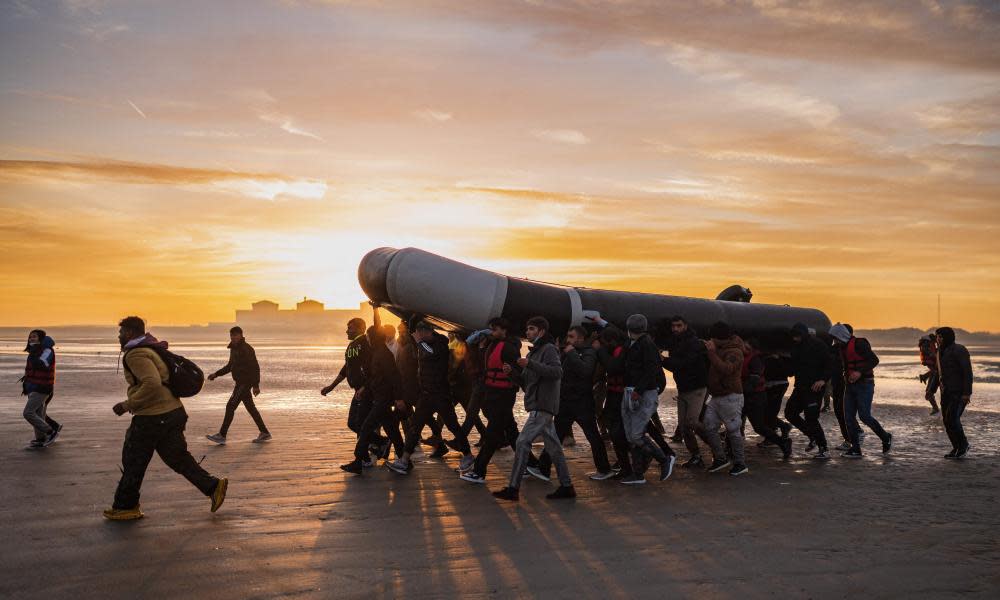Labour wants to fast-track asylum cases from ‘safe’ countries to clear backlog

Labour would rush through asylum applications for people from certain countries deemed “safe”, including Albania, in an attempt to clear the backlog of claims, Yvette Cooper has said.
The shadow home secretary said she wanted to create a new system under which the Home Office would prioritise some claims and process them within days.
The system would look similar to a scheme Labour operated while in government, which was abandoned after judges ruled it was “structurally unfair” after about 99% of claims were refused.
Cooper said a return to the fast-track system was warranted because of the huge delays in processing asylum applications. Nearly two-thirds of asylum applicants have been waiting more than six months for a decision, according to Home Office figures.
Cooper told Radio 4’s Today programme: “We would fast-track cases from designated safe countries – that does include Albania – where there’s been a very recent big increase in people arriving. And what it means is that if cases are clearly unfounded, they can be swiftly decided and swiftly returned.
“At the moment, the system is in chaos.”
The Home Office is struggling to clear the number of asylum applications it has outstanding. This year, 44,000 people have crossed the Channel in small boats, and the government says it is spending nearly £5m a day housing 37,000 people in hotels while their cases are processed.
Home Office figures show that in the year to June 2022, more than 7,000 Albanians made asylum applications in the UK having arrived on small boats. Only 50 of them have so far been given a decision.
The problem is causing a political headache for Rishi Sunak, who is coming under pressure from his own MPs to take more stringent action. Last month, 50 Conservative MPs wrote to the prime minister urging him to automatically reject asylum applications from those who claimed to be the victims of human trafficking and return them to “the villages from which they came”.
The home secretary, Suella Braverman, is reportedly drawing up plans to automatically refuse applications from anyone coming from “safe” countries, including Albania.
That idea has drawn sharp criticism from the UN, which said this week: “The only way to establish whether people are refugees is through a fair and efficient determination of their claims.”
Braverman also faced criticism from the UK statistics watchdog on Friday, which said her recent comments about immigrants “gaming” the modern slavery system were not supported by data. Ed Humpherson, the director general for regulation at the UK Statistics Authority, wrote in a letter: “We consider that the … statistics do not support the claims that people are ‘gaming’ the modern slavery system, and the source of the claim is unclear to us.”
Labour says its plans differ in that it would process the claims more quickly rather than automatically rejecting all those from certain countries.
Cooper said: “You have to have a system which decides individual cases on a fair basis. But it is possible to speed this up.”
Labour officials pointed to a report by the UN high commissioner for refugees that recommended prioritising cases which were either “manifestly founded” or “manifestly unfounded”.
“The move from a standardised refugee status determination for almost everyone claiming asylum in the UK towards more targeted and differentiated responses can contribute to decongesting the asylum system,” the report said.
Immigration reform campaigners, however, point out that when the scheme was last in place, the vast majority of claims were turned down almost immediately. Those who were turned down were then given less than two weeks for any appeals to be heard and decided.
This led to legal challenges from those who were turned down. In 2015, Lord Dyson, a senior court of appeals judge, ruled: “In my view the time limits are so tight as to make it impossible for there to be a fair hearing of appeals in a significant number of cases.”
Cooper said there would be provisions made for more complex cases, such as where Albanian women or children have been trafficked into sexual exploitation.
“You need to have a system which allows if there is a more complex case, then they obviously will need to take longer and you do need further consideration,” she said.
“But we also know that there are very straightforward cases that should be able to be decided very swiftly.”
The Home Office said: “The government is taking immediate action to bring the asylum backlog down. We have increased asylum caseworkers by 80% to more than 1,000 and are rolling out a successful pilot scheme nationwide to boost the number of claims processed.”

 Yahoo Movies
Yahoo Movies 
